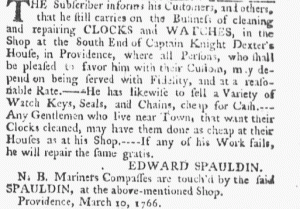What was advertised in a colonial newspaper 250 years ago today?

Given the publication history of the Providence Gazette, it is interesting that this advertisement appeared at all.
On March 12, 1766, William Goddard published “A Providence Gazette, Extraordinary.” Note that it was “A Providence Gazette” rather than “The Providence Gazette.” (The most recent issue had featured a masthead proclaiming “Vox Populi, Vox Dei. A PROVIDENCE GAZETTE Extraordinary” nearly seven months earlier on August 24, 1765. Not surprisingly, its contents focused on the then-impending Stamp Act. Regular publication on a weekly schedule had ceased with the issue of May 11, 1765. The newspaper finally resumed weekly publication in August 1766.) The four-page issue included “PROPOSALS for reviving the PROVIDENCE GAZETTE,” assorted news items from throughout the colonies, and testimonials from former and potential customers interested in Goddard resuming publication of the newspaper.
A half dozen or so advertisements appeared in a two-page “SUPPLEMENT to ‘A PROVIDENCE GAZETTE, Extraordinary,’ of Wednesday March 12, 1766.” (Did this supplement accompany the extraordinary issue? Or was it published later? The masthead does not make this clear.)
Edward Spauldin and a handful of other local shopkeepers, artisans, and merchants chose to insert advertisements in a newspaper that was not published on a regular schedule and did not have a slate of subscribers. They may have envisioned that the Extraordinary issue and its SUPPLEMENT would garner a fair amount of attention, allowing them an opportunity to present their goods and services for the consideration of potential customers in the area.
Spauldin’s advertisement was dated “PROVIDENCE, March 10, 1766.” (I checked the previous five issues to confirm that this was a new advertisement rather than one repeated from earlier but with an updated date.) Goddard may have approached him about inserting a commercial notice, but Spauldin ultimately made the decision about advertising in A Providence Gazette. This suggests that he believed in the effectiveness of advertising to incite business in the 1760s. He did not operate his business in an environment of pent-up demand but instead used advertising to create that demand with appeals to price and quality. In addition, he also included a money-back guarantee to get customers through the door: “If any of his Work fails, he will repair the same gratis.”
When “Sarah Goddard, and Company” resumed publication of the Providence Gazette on August 9, 1766, Edward Spaulding placed the same advertisement, except the nota bene had been eliminated and the date was revised to “Providence, August 8, 1766.” Perhaps he attributed new business in March to the original advertisement and decided to give it another try.
